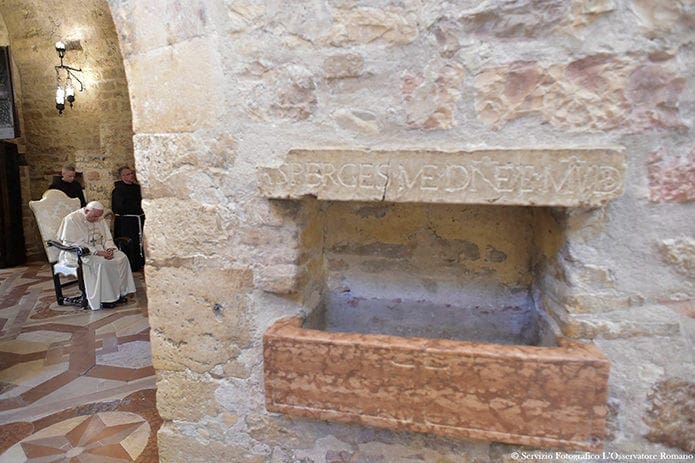 CNS photo/L'Osservatore Romano via Reuters
CNS photo/L'Osservatore Romano via Reuters Assisi
Forgive others and find peace, pope says during visit to Assisi
Published August 18, 2016
ASSISI, Italy (CNS)—Celebrating how God’s mercy has been experienced for 800 years in a tiny stone church in Assisi, Pope Francis said people need to experience God’s forgiveness and start learning how to forgive others.
“Too many people are caught up in resentment and harbor hatred because they are incapable of forgiving. They ruin their own lives and the lives of those around them rather than finding the joy of serenity and peace,” the pope said Aug. 4 during an afternoon visit to the Basilica of St. Mary of the Angels.
Pope Francis prayed silently for 10 minutes in the Portiuncola, a stone chapel in the middle of the basilica.
The abandoned chapel was entrusted to St. Francis of Assisi in the early 1200s. St. Francis restored the chapel in 1207 and two years later he founded his religious order there. The chapel is so important to the Franciscan family that when it was time to build a larger church, the new basilica was built around the chapel, leaving it intact.
The reason Pope Francis visited Aug. 4 and the reason thousands travel there each August is the “Pardon of Assisi,” a plenary indulgence offered to visitors who are sincerely sorry for their sins, go to confession, receive the Eucharist, recite the Creed and pray for the intentions of the pope as a sign of their unity with the church.
In Franciscan history, it was God who authorized St. Francis to offer the Assisi indulgence—a reduction of the punishment one rightly should endure because of sins committed. Kneeling in prayer, St. Francis asked the Lord to grant full pardon to those who came to the Portiuncola and confessed their sins. The Lord agreed. The next day—Aug. 2, 1216—Pope Honorius III agreed.
When Pope Francis ended his talk in Assisi, he put on a purple stole and heard confessions and asked all the Franciscan priests there to hear confessions.
Earlier, he told those gathered that St. Francis could ask for nothing greater than “the gift of salvation, eternal life and unending joy” for the townsfolk of Assisi.
“Forgiveness—pardon—is surely our direct route to that place in heaven” that Jesus promised his followers, the pope said. “What a great gift the Lord has given us in teaching us to forgive and, in this way, to touch the Father’s mercy!”
Pope Francis offered a reflection on the parable of “the unforgiving servant” from St. Matthew’s Gospel.
Like that servant, the pope said, many Christians feel they have a debt to God that they can never repay. “When we kneel before the priest in the confessional, we do exactly what that servant did. We say, ‘Lord, have patience with me.’”
And the Lord does, he said. Over and over again people confess the same sins and each time, God forgives them.
“The problem, unfortunately, comes whenever we have to deal with a brother or sister who has even slightly offended us,” Pope Francis said.
“Here we encounter all the drama of our human relationships,” the pope said. “When we are indebted to others, we expect mercy; but when others are indebted to us, we demand justice.”
“This is a reaction unworthy of Christ’s disciples and is not the sign of a Christian style of life,” Pope Francis said. “Jesus teaches us to forgive and to do so without limit.”